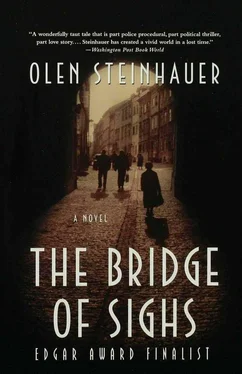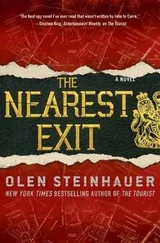Olen Steinhauer - The Bridge of Sights
Здесь есть возможность читать онлайн «Olen Steinhauer - The Bridge of Sights» весь текст электронной книги совершенно бесплатно (целиком полную версию без сокращений). В некоторых случаях можно слушать аудио, скачать через торрент в формате fb2 и присутствует краткое содержание. Жанр: Политический детектив, на английском языке. Описание произведения, (предисловие) а так же отзывы посетителей доступны на портале библиотеки ЛибКат.
- Название:The Bridge of Sights
- Автор:
- Жанр:
- Год:неизвестен
- ISBN:нет данных
- Рейтинг книги:3 / 5. Голосов: 1
-
Избранное:Добавить в избранное
- Отзывы:
-
Ваша оценка:
- 60
- 1
- 2
- 3
- 4
- 5
The Bridge of Sights: краткое содержание, описание и аннотация
Предлагаем к чтению аннотацию, описание, краткое содержание или предисловие (зависит от того, что написал сам автор книги «The Bridge of Sights»). Если вы не нашли необходимую информацию о книге — напишите в комментариях, мы постараемся отыскать её.
The Bridge of Sights — читать онлайн бесплатно полную книгу (весь текст) целиком
Ниже представлен текст книги, разбитый по страницам. Система сохранения места последней прочитанной страницы, позволяет с удобством читать онлайн бесплатно книгу «The Bridge of Sights», без необходимости каждый раз заново искать на чём Вы остановились. Поставьте закладку, и сможете в любой момент перейти на страницу, на которой закончили чтение.
Интервал:
Закладка:
“This songwriter’s dead?”
“That’s how they come to us, Brod.” He held out a handwritten sheet.
Male, Janos Crowder, 35, dead in apartment, severe trauma to head. Liberation Street 12.
“Called in after hours,” the chief muttered. “District police station took pictures, samples, the usual. I’ll let them know you’re coming.”
Emil opened his mouth. He wanted to ask what the usual meant, but nothing came out. His feet seemed to disappear from under him. He had his case. So quickly, easily.
“You need mobilization papers? Get going.”
Emil found his feet.
On the tram, he held on to a leather strap, a pendulum swinging between a woman taking bites out of a round loaf of bread and two laughing boys repeating damn and shit to one another. Emil recalled the dead man. At least one of his songs was very famous, something children sang in school. He’d heard them on their marches down the boulevards, looking smart in kerchiefs and buttons, but he couldn’t remember the name of the tune. Part of a lyric came to him as they left the First District’s mustard-colored administrative centers for the carved entryways and wrought- iron gates of the unbombed, still-prestigious part of the Fourth: There are White Guards in your heart that must be torn apart.
There was nothing left of Janos Crowder’s face for him to recognize.
The policeman who had been waiting for him-a boy little younger than Emil, with a loose-fitting blue uniform-let him in and nodded at the body. A wrench lay a few feet away, where it had stained the thick, white rug in a brown mess.
The melody would not leave-it revolved in his head. There are White Guards…
It was a lush, expensive apartment, and it had been ripped to pieces. The humid stench was everywhere. Upturned shelves lay on the floor, atop books and broken vases; the sofa cushions had been sliced open and ripped inside out. A baby grand piano filled a corner. Its lid was propped open, and on the carpet beside it lay framed pictures that had slid off.
It was the stink, Emil realized, of rotting meat. The musk of the country’s finest patriotic melody-maker turning to mold.
“Your chief said to leave it as it was.” The young cop held his cap in his hands, shaking his head. “Never seen anything like that before.”
The body was arched backward over a sturdy, coarse coffee table that looked like it had been made in the provinces. It was cracked and bent in the middle where the body had hit, but was not separated.
That was peasant craftsmanship for you…must be torn apart.
The wrench had been used to beat the face until it collapsed into pulp, then had been used on the back of the head, leaving tiny pink skull shards sprinkled over the carpet. Emil tried not to breathe through his nose.
He had seen plenty of dead bodies before-on the Arctic ship, in the fields and trains between Finland and here-but nothing quite like this. Not a corpse inside a wealthy man’s living room. The location separated it somehow, made it more appalling. Boats were for dead people. Trains and open fields. Not living rooms.
“Get some air in here, will you?”
The policeman opened the French windows. A hot breeze took some of the stink with it. Emil joined him and they looked out over the city, where clay and tin rooftops led into the distance.
Reluctantly, he went back and kneeled by the wrench. The steel was caked with blood, but there were no fingerprints, only gnarled threads. Once white, they were now a crusted brown. Gloves.
He went through the photographs that had slid off the opened piano. Behind framed, cracked glass was the Magyar face- prominent brow, gaping nostrils-he now remembered from clippings in The Spark. The dead man smiled broadly at a soiree with none other than General Secretary Mihai. Some of his best songs had been for their dashing partisan leader-now an overfed politician: a “thick Muscovite,” as they were called in private. The chubby arm of the interior minister hung over Crow- der’s shoulders in another picture.
Emil went through the other luminaries on the carpet, who presented the dead songwriter with star-shaped trophies and plaques which, despite the black and white, were plainly gold, their stars a glossy red. He wondered idly where these trophies were stashed, and how much they were worth. Shaking hands surrounded him on the floor, clapping hands and hands presenting valuable awards. And everywhere: big toothy smiles.
Then it came to him. A flush of understanding.
He had walked into a trap.
At first he didn’t believe it-the realization was too easy, too sudden. But he thought it through. It made more sense than he would have liked. Moska had given him this case to get rid of him.
He looked at the photo of the General Secretary again.
Janos Crowder was connected; he had friends at the very top. This simple fact made the case, by default, political. In political investigations, nothing was allowed to go wrong. At the first sign of a mistake, Emil would be ripped off his first case, maybe even kicked out of the department. The security inspector with the metallic gaze and peasant’s features would be handed the Crow- der case. He was probably sitting at his desk now, browsing through files, waiting for it.
His hands went cold, and the General Secretary, smiling, fell with Janos Crowder to the carpet. Emil patted his thighs to get the blood moving again. He stood up.
“Tell me about him,” Emil commanded the empty room.
The young policeman came out of the kitchen, licking butter off a finger. His peaked cap was set back on his head. Emil didn’t know how anyone could eat with this smell.
“Crowder. Tell me about him.”
“Comrade Janos Crowder,” the policeman recited from memory. “Songwriter of note, from Budapest originally, moved here just before the Patriotic War. An infantryman on the Front, suffered a shrapnel leg, Royal Medal of Honor. After the Liberation he produced a remarkable variety of songs honoring the country.”
“Remarkable variety?” asked Emil.
The policeman shrugged. “One hundred thirty-seven songs in two years.”
Emil nodded. “Remarkable. Anything else?”
The policeman sighed the last detail: “Married to Lena Hanic in 1945.”
“Has she been notified?”
“No, Comrade Inspector.”
“Good. I’ll do it myself. You’ve taken photographs?”
The policeman returned to the kitchen and came back with a large, cream-colored folder. It was heavy with prints.
“Who found the body?”
“Building supervisor. Aleksander Tudor. Was bringing up the mail.” He nodded at the vanity beside the door, where some envelopes lay. “Decided to leave them inside. This is what greeted him.”
Emil surveyed the demolished room, trying to remember what else to ask. In the Academy there had been simple checklists that alleviated the need to think things through, but he had gone blank. “Have the supervisor come up on your way out.”
“Youre done with me?”
Within the policeman’s voice, Emil thought he heard something like surprise. Surprise that the interview was so short. So incomplete, inept. “You have the wife’s address?”
The policeman paused, eyes shifting across the floor, deftly bouncing around the corpse.
“Call it into the station,” said Emil. “They’ll leave it on my desk.” Even as he said it, he wasn’t sure he believed it.
Three envelopes, all bills. He opened and read each in the vain hope that something would float to the surface, but the first two were nothing but the mundane finances of life. An expensive tailor on Yalta Boulevard had made Janos Crowder a suit and was waiting for his payment. A greengrocer two blocks away was becoming impatient for his fee. The third, though, was from the Aeroflot office down by the Tisa, the itinerary for a flight to Berlin that was leaving this morning. Emil checked his father’s watch- 12:40. A flight that had just left.
Читать дальшеИнтервал:
Закладка:
Похожие книги на «The Bridge of Sights»
Представляем Вашему вниманию похожие книги на «The Bridge of Sights» списком для выбора. Мы отобрали схожую по названию и смыслу литературу в надежде предоставить читателям больше вариантов отыскать новые, интересные, ещё непрочитанные произведения.
Обсуждение, отзывы о книге «The Bridge of Sights» и просто собственные мнения читателей. Оставьте ваши комментарии, напишите, что Вы думаете о произведении, его смысле или главных героях. Укажите что конкретно понравилось, а что нет, и почему Вы так считаете.












